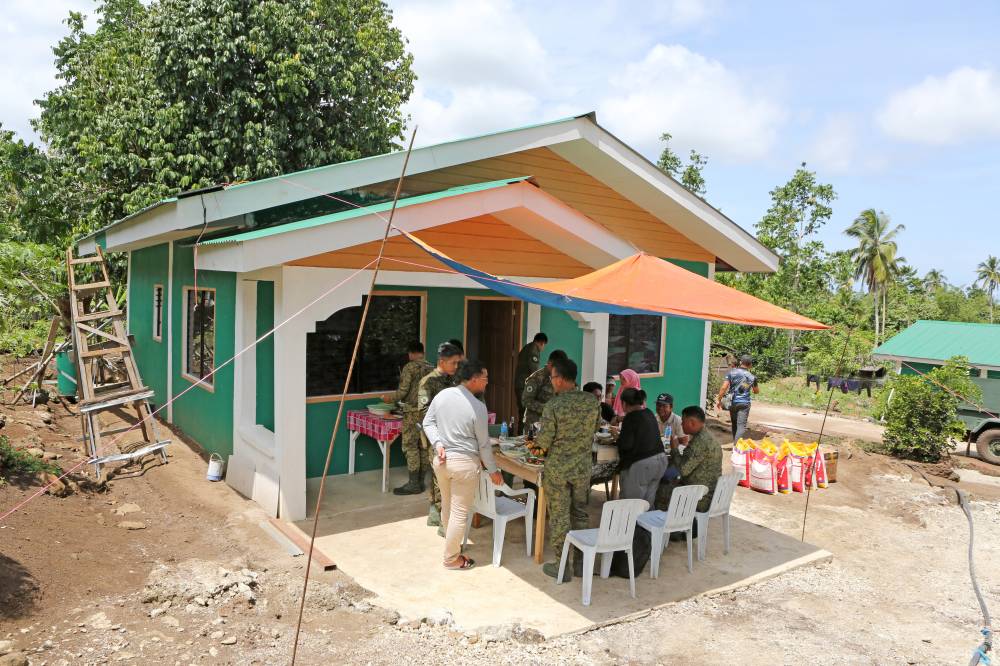Ex-Moro rebels in Basilan now proud homeowners

FAMILY SHELTER This 80-square-meter house, inaugurated on March 10 in the presence of local government and military officials, is one of the 20 units at Sitio Marang-Marang, Barangay Tuburan Poblacion, in Hadji Mohammad Ajul, Basilan, awarded to former combatants of the Moro Islamic Liberation Front undergoing the decommissioning process. —JULIE S. ALIPALA
HADJI MOHAMMAD AJUL, BASILAN—“Peace is having a home that you can call your own,” Hadja Habiba Asmawil, 61, a mother of three, said in Yakan.
For most of her life, she lived in a tiny makeshift home, where her whole family used to sleep, eat, rest and cook.
But in December last year, a green and white bungalow within an 80-square-meter area in the town’s Camp Abu Muthana in Sitio Marang-Marang, Barangay Tuburan Poblacion of this once troubled town in Basilan province was turned over to her and her husband, a former combatant of the Moro Islamic Liberation Front (MILF), which had since forged a peace accord with the government.
“I never imagined that I would get to live in this huge home,” Habiba said. “It was a dream [come true]. When I received the keys, I cried so hard,” she said in an interview on March 10.
Her family, like most people in Sitio Marang-Marang, was frequently displaced by armed conflicts.
Article continues after this advertisement“I was thinking when we entered the house: if there’d be a shooting war, I can easily roll over to the floor,” she said, knocking on her wooden door. “If there’s rain, I don’t need to cover my roof with tarpaulin.”
Article continues after this advertisementMayor Talib Pawaki of Hadji Mohammad Ajul town told the Inquirer over the weekend that Habiba’s house was one of the 50 housing units turned over to the town by the Bangsamoro Office of the Chief Minister under the project “Kapayapaan sa Pamayanan,” with each of the semiconcrete bungalow unit costing between P500,000 and P600,000.
Qualified recipients
Geon Arasad, the camp commander of the MILF here, said they had more than 200 families in the area, but only 20 former combatants were qualified to get the units under the government’s normalization and decommissioning program. Habiba’s husband was one of the 20 decommissioned combatants.
In February this year, the mayor said he also received commitment for another 225 houses for the former mujahideen (Moro fighters), their widows and marginalized sectors in his town. The P135-million project will be built in the town’s Barangay Sironggon, he said.
Kasim Hasanin, Basilan district engineer of the Ministry of Public Works, said they were working to finish the next 225 housing units before the 2025 national elections.
“Normally, the program entails 365 calendar days but we want to expedite the process due to the upcoming elections. Our target is to complete it before the end of this year,” Hasanin said.
Gains of peace
Brig. Gen. Alvin Luzon, commander of the 103rd Army Brigade, said the military used to categorize Marang-Marang village as hostile because of family feuds and the presence of armed men, referring to the combatants of the MILF.
This is the first time that people in the village get to taste the gains of peace.
“It was no-no for our troops to pass here before due to lingering animosity among members of the MILF,” said Luzon who visited the area on March 10.
He recalled how they learned about the standing “rido” (clan war) between Arasad’s group and another MILF commander, Tanad Nasalon, and tried to patch it up with the help of local officials.
“What we did was to research deeper the cause of their animosity. When we found out it was disinformation, fake news on social media and political manipulations, we started initiating talks with the help of the municipal officials,” Luzon said.
Arasad said the localized negotiation started with sharing of food. Habiba and several women started serving biscuits, mineral water and “kahawa” (brewed coffee) during the start of negotiations.
READ: Ex-Moro rebels join PNP as gov’t honors peace deal
Several women persuaded people to share simple food to ease the tension as men combatants sat and threshed their misunderstanding.
“It felt like a thorn was removed from my throat when I was able to embrace my longtime friend Nasalon and we patched up our differences without resorting to blood money,” Arasad recalled.
Habiba felt content after she learned that the two warring groups in her community finally settled their differences.
“I can already decorate my home,” she said. “My husband and I can finally sleep well. He is able to keep his weapon away. This place, this home is peace for me and for other women who never had a house before,” she said. INQ